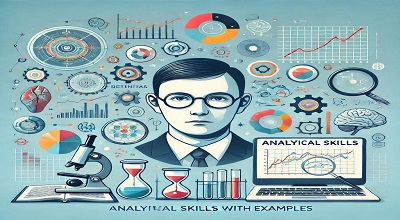Definition of Analytical Skills
Analytical skills are the ability to collect and analyze information, problem-solve, and make decisions. These skills are highly valued in many jobs and industries because they enable individuals to solve complex problems, make better decisions, and improve processes. Analytical skills are not just confined to mathematical or scientific fields; they are crucial in various areas including business, finance, marketing, health, information technology, and more.
Key Components of Analytical Skills
- Data Collection and Analysis: This involves gathering data from various sources, understanding its relevance, and analyzing it to conclude. It requires a keen eye for detail and the ability to distinguish between relevant and irrelevant information.
- Critical thinking: It’s about being objective, questioning assumptions, and evaluating arguments or propositions critically. Critical thinkers can differentiate facts from opinions and are adept at identifying logical connections between ideas.
- Problem-Solving: This skill involves identifying the root cause of a problem, generating potential solutions, and choosing the most effective one. It requires creativity, logical reasoning, and the ability to evaluate the pros and cons of different solutions.
- Decision Making: Analytical skills are crucial in making informed decisions. This involves weighing evidence, considering alternatives, and foreseeing potential outcomes and implications.
- Communication: Effective analytical skill are complemented by the ability to communicate findings and insights clearly and persuasively, both in writing and verbally.
Examples of Analytical Skills in Various Fields
- Business and Finance: Financial analysts use analytical skills to evaluate investment opportunities by analyzing market trends, financial statements, and economic indicators.
- Marketing: Marketers use analytical skill to understand market trends, consumer behavior, and the effectiveness of marketing campaigns. They often use tools like Google Analytics to gather and interpret data.
- Healthcare: Healthcare professionals use analytical skill to diagnose diseases and develop treatment plans. They analyze patient data, research findings, and clinical trials to make informed decisions.
- Information Technology: IT professionals use analytical skill to troubleshoot issues, improve system performance, and develop new technologies. They analyze code, system metrics, and user feedback to enhance technology solutions.
- Education: Educators use analytical skills to assess student learning, develop curriculum, and improve teaching methodologies. They analyze test scores, student feedback, and educational research to enhance learning outcomes.
Improving Analytical Skills
- Continuous Learning: Stay updated with industry trends and technologies. Engaging in continuous learning helps enhance analytical thinking.
- Practice problem-solving: Regularly engage in activities that require problem-solving, such as puzzles, brain teasers, or case studies.
- Seek Feedback: Getting feedback from peers or mentors can provide new perspectives and insights into your analytical process.
- Use Analytical Tools: Familiarize yourself with tools and software that aid in data analysis, such as Excel, SPSS, or specific industry-related software.
- Collaboration: Collaborating with others can provide different viewpoints and approaches to a problem, enhancing your analytical abilities.
Conclusion
Analytical skills are essential in the modern workforce, enabling individuals to make informed decisions, solve complex problems, and drive innovation. Whether you’re in business, healthcare, IT, education, or any other field, cultivating strong analytical skill can significantly contribute to your professional success and organizational growth.
